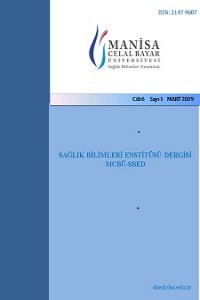Parenteral İlaç Uygulamaları Konusunda Hemşirelik Öğrencilerinin Bilgi ve Beceri Düzeylerinin Sınav Kaygısı ile İlişkisi
Öz
Amaç: Hemşirelik öğrencilerinin ventrogluteal bölgeye intramüsküler
enjeksiyon (İM)) ve intravenöz enjeksiyon (IV) uygulamaları konusunda
bilgilerini ve becerilerini değerlendirmek, öğrencilerin bilgi ve becerilerinin
sınav kaygısı ile ilişkisini incelemektir.
Gereç ve Yöntem: Araştırmanın evrenini Manisa Celal Bayar
Üniversitesi Sağlık Bilimleri Fakültesi Hemşirelik Bölümünde 12 Şubat-25 May
2018 tarihleri arasında Hemşirelik Esasları Dersinin teorik ve laboratuvar
sınavına giren 102 öğrenci oluşturdu. Tanımlayıcı ve kesitsel nitelikte bir
çalışmadır. Veri toplamada sınav öncesinde Öğrenci Tanılama Formu ve Sınav
Kaygısı Ölçeği, sınav sırasında bilgi ve becerilerini değerlendirmede Mesleki
Beceri İşlem Basamakları Formu kullanıldı.
Bulgular:
Hemşirelik
öğrencilerinin laboratuvar sınavından aldıkları İM enjeksiyon uygulaması bilgi
ve beceri puanı ortalaması sırasıyla 80,56±12,50,
81,72±11,76; IV enjeksiyon
uygulaması bilgi ve beceri puan ortalaması 87,82±10,69, 89,16±8,83
olarak saptandı. Öğrencilerin hemşirelik esasları dersinin ara dönem teorik
ders notu puan ortalaması 77,66±9,42, sınav
kaygısı puan ortalaması ise 43,76±10,90
olarak saptandı. Öğrencilerin laboratuvar sınavı uygulamalarındaki bilgi
ve beceri puan ortalamaları ile sınav kaygısı puan ortalamaları arasında
herhangi bir ilişki saptanmadı (p>0,05).
Sonuç: Öğrencilerin laboratuvar
uygulamalarındaki bilgisi ve becerisi iyi düzeydedir. Öğrencilerin
laboratuvar sınavı uygulamalarındaki bilgi ve beceri puan ortalamaları ile
sınav kaygısı puan ortalamaları arasında anlamlı bir ilişki yoktur.
Anahtar Kelimeler
Kaynakça
- Roh YS, Kim SS, Kim SH. Effects of an integrated problem-based learning and simulation course for nursing students. Nurs Health Sci 2014;16:91-6.2. Pai HC, Ko HL, Eng CJ, Yen WJ. The mediating effect of self-reflection and learning effectiveness on clinical nursing performance in nursing students: A follow-up study. J Prof Nurs 2017;33:287-92.3. Sağkal T, Edeer G, Özdemir C, Özen M, Uyanık M. Nursing students’ knowledge about intramuscular injection. Journal of Anatolia Nursing and Health Sciences 2014;17:80-9.4. Sarmasoğlu Ş, Dinç L, Elçin M. Nursing students’ opinions about the standardized patients and part task trainers used in the clinical skills training. HEAD 2016;13: 107-15.5. Bradley P. The history of simulation in medical education and possible future directions. Med Educ 2006;40:254-62. 6. Jones RS, Simmons A, Boykin Sr GL, Stamper D, Thompson JC. Measuring intravenous cannulation skills of practical nursing students using rubber mannequin intravenous training arms. Military Med 2014;179:1361-7. 7. Mete S, Uysal N. Evaluation of psychomotor skill training at the nursing professional skill laboratory by students and instructors. HEMAR-G 2010;12:28-38.8. Midilli TS, Çevik K, Baysal E. Assessment of the relationship between test anxiety and the levels of knowledge and skills about laboratory practices for nursing students. Sdü Sağlık Bilimleri Enstitüsü Dergisi 2017;8:43-54. 9. Zengin D, Yardımcı F. An Evaluation of the effectiveness of the educational videos on pediatric diagnostic skills in nursing. DEUHFED 2017;10:267-74.10. Boztepe H, Terzioğlu F. Skill assessment in nursing education. Journal of Anatolia Nursing and Health Sciences 2013;16:57-64.11. Sossah L, Asiedu Y. Stress Management and resilience in junior and senior nursing students in Ghana. European Journal of Research and Reflection in Educational Sciences 2015;3:46-53.12. Wafika AS, Halabi J. Critical thinking, self-esteem, and state anxiety of nursing students. Nurse Educ Today 2007;27:162-168.13. Karaca A, Yildirim N, Ankarali H, Açikgöz F, Akkuş D. Adaptation to Turkish of Nursing Education Stress Scale. HEMAR-G 2014;16:29-40.14. Chan CKL, So WKW, Fong DYT. Hong Kong Baccalaureate nursing students' stress and their coping strategies in clinical practice. J Prof Nurs 2009;25:307-13.15. Melincavage SM. Student nurses' experiences of anxiety in the clinical setting. Nurse Educ Today. 2011;31:785-9.16. Zyga S. Stress in nursing students. International Journal of Caring Sciences 2013;6:1-2.17. Spielberger C, Vagg R. Test anxiety: A transactional process model. Test Anxiety: Theory Assesment and Treatment.1st ed. USA: Taylor and Francis; 1995. p.3-13. 18. Öner N. Examination anxiety inventory handbook. İstanbul: Yöret Vakfı Yayını;1990.p.51.19. Tel H, Tel H, Sabancıoğulları S. The anxiety status of first year students of nursing at the intramuscular injection laboratory practice to each other and the first day of clinical training. Atatürk Üniversitesi Hemşirelik Yüksekokulu Dergisi, 2004;7:10-5.20. Gülnar E, Özveren H. An Evaluation of the effectiveness of a planned training program for nurses on administering intramuscular injections into the ventrogluteal site. Nurse Educ Today 2016;36:360-3.21. Brown J, Gillespie M, Chard S. The dorso–ventro debate: in search of empirical evidence. Br J Nurs 2015; 24:1132-9.22. Kaya N, Salmaslıoğlu A, Terzi B, Turan N, Acunaş B. The reliability of site determination methods in ventrogluteal area ınjection: a cross-sectional study. Int J Nurs Stud 2015; 52:355-60.23. Tuğrul E, Denat Y. Nurses’ knowledge, opinion and practices regarding to injection practices in ventrogluteal site. DEUHYO ED 2014;7:275-84.24. Vicdan AK, Sü S, Alpar ŞE. Use of the ventrogluteal area in the intramuscular injection. Yıldırım Beyazıt Üniversitesi Sağlık Bilimleri Fakültesi Hemşirelik E-Dergisi 2015;3:56-61.25. Gülnar E, Çalışkan N. Determination of knowledge level of nurses regarding ıntramuscular ınjection administration to ventrogluteal site. DEUHYO ED 2014;7:70-7.26. Lynn P. Taylor’s Clinical Nursing Skills - A Nursing Process Approach. Çeviri Editörü: Bektaş H. Taylor Klinik Hemşirelik Becerileri Bir Hemşirelik Süreci Yaklaşımı. 3. basımdan çeviri, Ankara: Nobel Akademik Yayıncılık Eğitim Danışmanlık Tic. Ltd. Şti;, 2015. s:190-8.27. Aştı TA, Karadağ A. Klinik Uygulama Becerileri ve Yöntemleri. İstanbul: Nobel Tıp Kitabevi; 2011. s.716-23.28. Hacıhasanoğlu R, Karakurt P, Yılmaz S, Yıldırım A. The determination of anxiety levels as to clinic practice of the first class students of the health collagage’s students. Atatürk Üniversitesi Hemşirelik Yüksekokulu Dergisi 2008; 11: 69-75.29. Arabacı BL, Korhan AE, Tokem Y, Torun R. Nursing students’ anxiety and stress levels and contributed factors before-during and after first clinical placement. Journal of Hacettepe University Faculty of Nursing 2015;2:1-16.30. Karagözoğlu Ş, Özden D, Türk G, Tok Yıldız F. Anxiety, stress levels experienced by nursing students studying in the classical and ıntegrated curriculum in their first clinical practice and some affecting factors. DEUHYO ED 2014;7:266-74.
Ayrıntılar
| Birincil Dil | Türkçe |
|---|---|
| Konular | Klinik Tıp Bilimleri |
| Bölüm | Araştırma Makalesi |
| Yazarlar | |
| Yayımlanma Tarihi | 29 Mart 2019 |
| Yayımlandığı Sayı | Yıl 2019 Cilt: 6 Sayı: 1 |


